The Last Train to Key West by Chanel Cleeton September 24, 2020
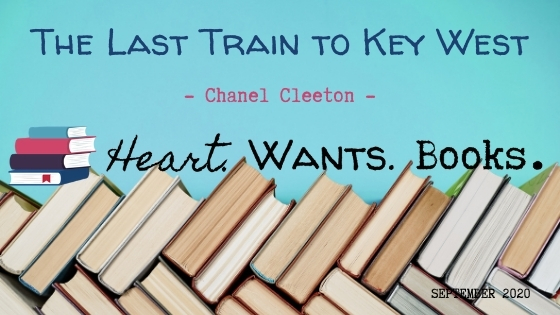
The following post includes affiliate links. More details here.
Dear readers, are you ready for another bit of insight into how the Heart.Wants.Books sauce is made? Well, here it is. I’ve shared that if I wait too long to draft a post, then I get all sorts of things wrong about the book (incorrectly referring to Bennett sisters is the most memorable I can come up with right now), and Ashley has to work extra hard to fix my mess, so I just try not to wait. Ideally, I finish a book and then process a few days and write it up. I’m always reading something, so this is a delicate balance of processing and reading and sometimes it works better than others. We’ve made no secret that we’ve started #witchyreads in preparation for a month-long celebration in October (which #spoileralert, starts a week from today, or at Virtual Book Club last Friday, whichever), so I’ll not hold back and share that I finished The Last Train to Key West by Chanel Cleeton in two days (yes, TWO) and then jumped straight into an intense witchy read. That was not my best plan dear readers. Now I have a quiet moment to think and type and I’m consumed by this witchy read, and also distracted by the recent hurricane that has ravished parts of the Gulf Coast. Here’s the thing though, I’m also resisting the urge to check out and/or one click Cleeton’s back list. Too many great books is a glorious problem to have!
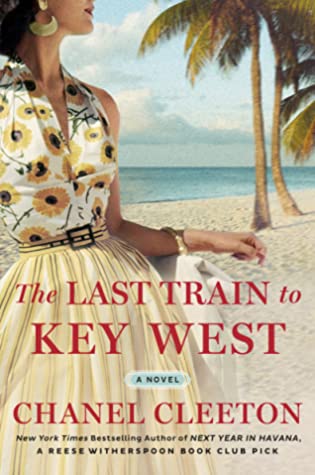
The Last Train to Key West is historical fiction, with a heaping side of romance, that follows the lives of three very different women leading up to and immediately following the Labor Day hurricane that hit the Florida Keys in 1935. We meet each of these three women in Key West. Helen grew up in Key West and is struggling in her abusive marriage, lasting this long because of her husband’s frequent absences on his fishing boat. Mirta has just entered into an arranged marriage and is honeymooning in the Keys on her way from trying to help her family and escape the politics in Cuba to her new life in New York with her notorious husband she is just getting to know. Elizabeth has come to Florida in search of the sender of a letter, and a way out of the mess her family is in following the stock market crash of 1929. I knew nothing about the hurricane, one of the strongest and deadliest to hit the US, before reading this book, only that there was a hurricane as a plot point in this book. Here’s why we read the author’s notes and acknowledgements: Cleeton, a Florida native, wrote this book because she’d read about the 1935 Labor Day hurricane, and the tragic loss of so many World War I veterans who were in the Keys working on the highway. I don’t know about you all, but historical fiction is my favorite way to learn about history. As a political science major who also did a deep dive into the first half of the twentieth century in AP US History, the Bonus Army wasn’t news to me, but what happened with the veterans after they left Washington, D.C. wasn’t something I remembered from school (and may not have even been covered), so I’m especially glad to have this story told in a new way.
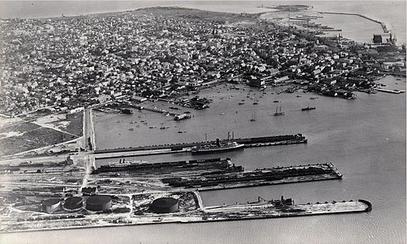
from Wikipedia
While The Last Train to Key West, really is about how the 1935 Labor Day hurricane affects those in its path, it’s also about man’s efforts to dominate nature, how the Keys and mother nature refused, and how the Great Depression affected people from different socio-economic backgrounds. All of that is told through the lens of our three women who are each trying to make the best of various abhorrent situations and do anything they can to save their families and create a better life for themselves, IN THE MIDDLE OF A HORRIFIC HURRICANE. One thing I adore about more recent titles in general is the inclusion of consent. Elizabeth is clear from the start that she knows her power as a woman and does not hold back her opinions from Sam, mainly that cultural acceptance is the only thing limiting her. From her first page, we know Mirta has concerns about the (lack of a) physical side of her arranged marriage to a practical stranger. For all of Anthony’s issues, he is kind to his wife, in and out of bed, and makes it clear that he wants a real marriage and he’s not going to mess that up by rushing marital relations that his proper society wife isn’t emotionally ready to handle. While the bedroom scenes are closed-door, we know he takes his time, and is open with her about why. I don’t want to speak about Helen’s experiences because spoilers, but we know her husband is abusive, and others who interact with her know this too and are very considerate of her past experiences. THIS IS THE WAY.
I want to say more about this, but also I don’t. The Last Train to Key West is beautifully written with gorgeous descriptions, and the women have depth, even though we track three main characters in only 300 pages (most of the book takes place in only a few days). There is a bit of a bow at the end, but not enough for me (and I’m hoping for more since this is a June 2020 release, but not expecting it as her next book will take readers back to Cuba in May). I give this book an enthusiastic four stars. While I am not likely to reread this any time soon (unless we get a follow up and then I am very likely to reread), I am stoked to dig into Cleeton’s back list, and not just Next Year in Havana and When We Left Cuba, but also her romance novels too! [Ashley Here: From what I found researching & reading reviews on the internet, all three of these novels follow female members of the Perez family from Cuba…so, yeah for a re-read buddy!]
What’s a book you’ve read that made you want to dive deep into the author’s backlist? Or, what’s a fictional book that you adore for the way it brings history to life?
~Nikki

This is my first Chanel Cleeton novel and like Nikki I am ready to dive into her backlist – except #witchyreads are priority for now. Per the usual, I’m here to give you the info on the author, and I am not going to lie that I was astonished and amazed by Chanel Cleeton, Esq. A native Floridian, Cleeton received her undergraduate degree in International Relations from The American International University in London, her Masters in Global Economics from the London School of Economics and Political Science, and earned her Juris Doctor from the University of South Carolina School of Law. She has lived all over the world and has been interested in history and storytelling her whole life, figuratively cutting her teeth on her family’s stories of their exodus from Cuba following the Cuban Revolution. Her debut historical fiction novel, Next Year in Havana, was the Reese Witherspoon Book Club pick in July 2018, even though the book was released in February of that year. I am here for anything else she writes and this 4 star read has a high probability to be on the re-read list in the future.
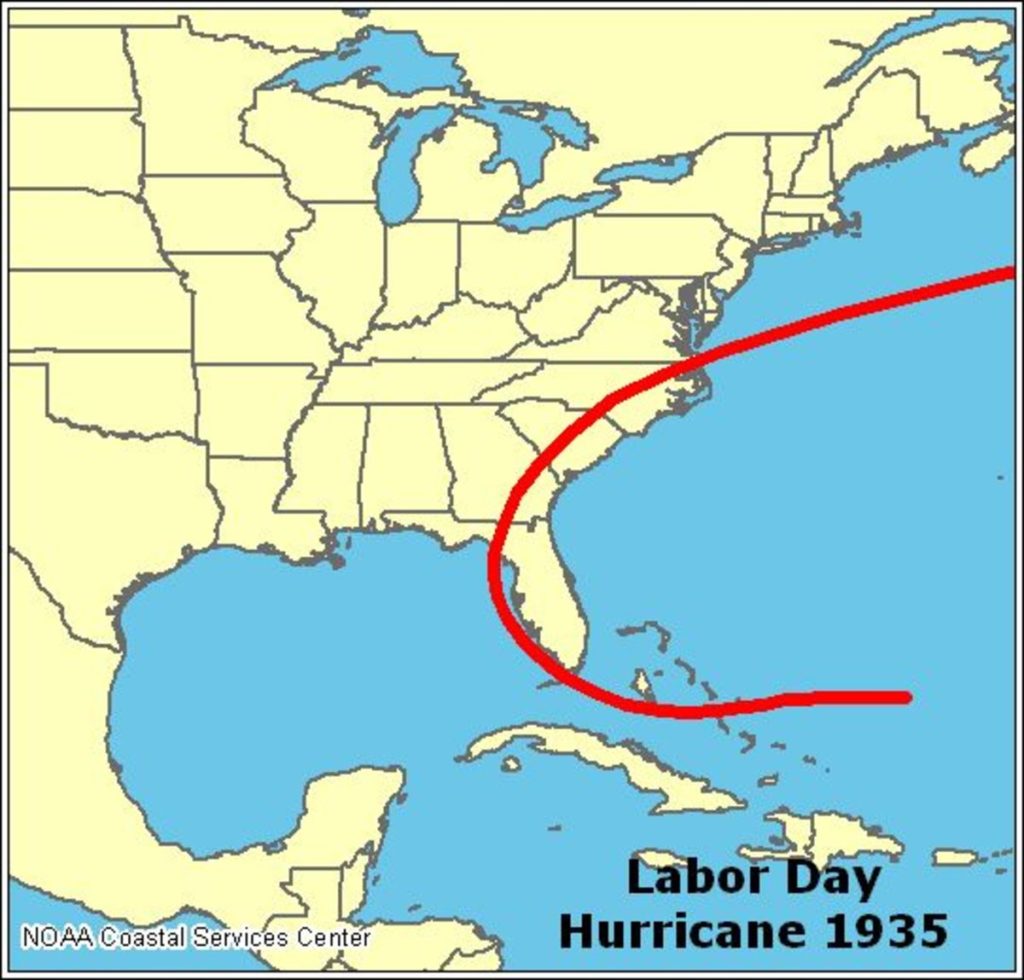
Yes, it’s high Atlantic hurricane season during September 2020, and the National Oceanographic and Atmospheric Administration (NOAA) has gone Greek for the second time in the history of naming tropical storms. Once the 21 alphabetical names are used up (names never begin with Q, U, X, Y, or Z), storms are named after the Greek Alphabet. Typically the season begins on June first and runs until November thirtieth, but per usual 2020 style, Arthur was our first named storm on May sixteenth. This is only the second time in the history of naming storms the NOAA has used the Greek alphabet since the inception of naming in the early 1950’s, the first time being the 2005 season infamous for Katrina which we covered in our July post on Sarah M. Broom’s The Yellow House. So, it’s a little weird to be calling the hurricane that takes place during The Last Train to Key West the Labor Day Hurricane of 1935, but here we are, having to discuss a Category 5 hurricane without a name, the only one of the four Cat 5’s on record that have hit the United States without a name.
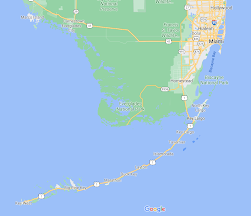
What I find really interesting, after quite a bit more Google research, is that the railroad, Flagler’s Folly, the Overseas Railroad, or the Florida Overseas Railroad (all names for the same thing) really did have a final train into Key West; it was the one upon which Elizabeth arrives into town. Once the storm hits on the Monday evening no more trains will be able to make it to Key West, 40 miles of track were washed away by the storm near the village of Islamorada, where the majority of our story takes place. If you look at the Google map here, you will see that Islamorada is basically the mid-point between Miami and Key West. Between our Bluewater Billionaire babes books in February (they’re on sale for $.99 each and we one-clicked), Their Eyes Were Watching God in August, and this book, I’m ready for a trip to Florida, hurricanes, schmurricanes. (PS: the hurricane that takes place in Their Eyes Were Watching God was based upon a 1928 hurricane even though the book wasn’t published until 1937. Y’welcome.)
I guess I should actually talk about the book, since that’s what you come to us for, but I am a historian so I know you give me much grace in needing to share all the nuggets of info I come upon in my quest for more story background. Cleeton’s writing is evocative and intense, the reader is sucked in and I can’t believe it was only 300ish pages for a story so deeply personal to all three women which involved their background, their men, and a freaking natural disaster. It should have been more and yet I read it so quickly (also 2 days!) it felt like much less. Who I really loved were many of the local characters who play such a part in Helen’s past and much of the present story – like Ruby of Ruby’s Diner and Helen’s aunt. One of my favorite lines comes from Helen’s aunt: “I hate to tell you, but there’s no such thing as a ‘right time’ in life. Things happen when they need to happen. The rest sort of falls into place.” I want to be an Aunt just like her. Loving, accepting, independent, fiscally responsible, and doling out bits of wisdom you’d never expect just like she were Socrates. I probably could never be such a cool hotel owner, though TBH I’ve wanted to be Lorelei Gilmore when I grew up since before being Lorelei Gilmore was an option. (I want to have a B&B y’all.) In conclusion, I also wish, too, that at the beginning of my marriage I had pushed to have more of a partnership of equals rather than what others had told me to want from my relationship, #traditionalgenderroles, so that I could now feel more empowered in making the choices that I have made as regards my career and trajectory towards perpetual #AuntLife. I wish I had had that person telling me “You Do You” as a twenty-something rather than as a thirty-something, but things happen when they need to happen, so that’s why we’re here talking about it now.
Is there a novel you’ve read recently that has passages or characters that hit you in a certain way that you wish your younger self could have benefited from the knowledge?
~Ashley
PS: Check out this Book Club Kit from the author, with food and drink recipes, an extended reading list, and even a Spotify playlist!


